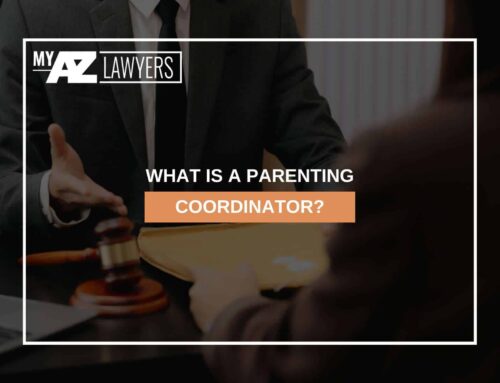Table Of Contents
New Cell Phone Technology, a Possible Problem For Arizona Family Law
The emergence of technology allowing people and objects to be removed from pictures could indeed have significant implications for family law cases and child support cases in Arizona, particularly in scenarios involving concerns about the safety and well-being of children. Here’s how this technology might impact such cases and potential solutions to address the challenges it presents:
- Evidentiary Challenges: One of the primary concerns is that crucial evidence of inappropriate behavior or unsafe environments may be easily erased or manipulated using this technology. For instance, if a parent is dating someone with a criminal record who poses a risk to the children, evidence of their presence could be removed from photographs, potentially misleading the court.
- Subversion Of Parenting Evaluations: In cases where parenting evaluations or assessments are conducted to determine custody arrangements or visitation rights, manipulated photos could misrepresent the reality of the child’s living environment or the behavior of the parents involved.
- Impact On Substance Abuse Cases: Evidence of substance abuse, such as vaping, smoking weed, or drug use around children, could be erased from photographs, making it challenging to prove allegations of neglect or endangerment.
- Increased Challenges For Legal Proceedings: Family law attorneys and courts may face increased difficulties in verifying the authenticity of photographic evidence and establishing the credibility of claims made by either party.

Solutions
- Education & Awareness: Legal professionals, judges, and individuals involved in family law cases should be educated about the existence and potential impact of this technology. They need to understand its capabilities and limitations to make informed decisions about the admissibility and reliability of photographic evidence.
- Forensic Analysis: Courts may need to employ forensic experts to scrutinize photographic evidence thoroughly, looking for signs of manipulation or tampering. These experts can provide testimony regarding the authenticity of the evidence presented.
- Diversification of Evidence: Emphasizing the importance of corroborating evidence beyond photographs can mitigate the risk posed by manipulated images. Testimony from witnesses, documentation of incidents, and other forms of evidence should be given due consideration.
- Regulatory Measures: Policymakers may need to explore regulatory measures to address the misuse of such technology in legal proceedings. This could involve developing guidelines or standards for the authentication of digital evidence and imposing penalties for the deliberate manipulation of photographs in family law cases.
- Technological Countermeasures: Researchers and developers could work on creating tools or algorithms capable of detecting image manipulation. Such tools could assist legal professionals in identifying potentially altered photographs and assessing their reliability as evidence.
Can Images & Pictures Stored On Cell Phones Be Used In Family Law Cases?
Yes, images stored on cell phones can be used as evidence in family law cases, including matters related to child custody, visitation rights, and support arrangements. These images may include photographs or videos documenting various aspects of family life, such as interactions between parents and children, living conditions, or instances of concerning behavior.
Here are some key points to consider regarding the use of images stored on cell phones in family law cases:
- Relevance: The images must be relevant to the issues being addressed in the case. For example, photos showing a parent’s involvement in activities that could impact their ability to care for the child, such as substance abuse or neglect, may be considered relevant evidence.
- Authentication: It’s essential to establish the authenticity of the images to ensure their admissibility in court. This may involve providing testimony or other evidence to demonstrate that the images were not altered or manipulated.
- Privacy Considerations: Parties should be mindful of privacy concerns when using images stored on cell phones as evidence. This includes obtaining consent from individuals depicted in the images and ensuring compliance with applicable privacy laws.
- Corroboration: Whenever possible, it can be beneficial to corroborate photographic evidence with other forms of evidence, such as witness testimony, documentation, or expert opinions, to strengthen its credibility.
- Legal Representation: Individuals involved in family law cases should seek guidance from legal professionals who can advise them on the use of photographic evidence and its potential implications for their case.
Overall, images stored on cell phones can serve as valuable evidence in family law cases, but it’s essential to approach their use thoughtfully and in accordance with legal standards and procedures.
Can You Be Sure That Photos Used In Arizona Family Law Cases Are Not Altered By New Cell Phone Technology?
Ensuring the authenticity and integrity of photographic evidence, especially in the face of advancing technology, is indeed a significant challenge in legal proceedings, including family law cases in Arizona. While it’s not possible to guarantee with absolute certainty that photos used as evidence have not been altered, several measures can be taken to mitigate the risk:
- Forensic Analysis: Legal professionals can employ forensic experts who specialize in digital image analysis to scrutinize photographs for signs of manipulation or tampering. These experts can examine metadata, image compression artifacts, and other indicators to assess the authenticity of the photos.
- Chain Of Custody: Establishing a clear chain of custody for photographic evidence helps ensure its integrity. This involves documenting who had access to the photos and any actions taken with them from the time they were captured or obtained to their presentation in court.
- Witness Testimony: Testimony from witnesses who can attest to the circumstances surrounding the photos, such as when and where they were taken and who was present, can help bolster their credibility.
- Corroborating Evidence: Whenever possible, corroborate photographic evidence with other forms of evidence, such as witness statements, documentation, or physical evidence, to strengthen its reliability.
- Expert Testimony: In cases where there are concerns about the authenticity of photographic evidence, expert witnesses can provide testimony regarding image analysis techniques and their findings.
- Court Rules & Procedures: Familiarize yourself with Arizona’s court rules and procedures regarding the admission of photographic evidence. Courts may have specific requirements for the authentication and presentation of such evidence.
While these measures can help mitigate the risk of altered photographic evidence, it’s essential to recognize that no method can guarantee absolute certainty. As technology continues to evolve, legal professionals must remain vigilant and adapt their strategies for evaluating and presenting photographic evidence in family law cases. Our Arizona family attorneys stay abreast of the ever-changing technology by cell phone giants Apple, Google, and Samsung.
Future Outlook:
As technology continues to advance, the problem of manipulated photographic evidence in family law cases may indeed increase. However, with proactive measures such as those outlined above, it is possible to mitigate the associated risks and uphold the integrity of legal proceedings concerning child custody, support, and welfare. Continuous monitoring of technological developments and adaptation of legal strategies will be essential to address emerging challenges effectively. For further guidance on navigating these complex issues in family law, contact us at My AZ Lawyers for expert legal support and consultation.
Arizona Offices:
Mesa Location:
1731 West Baseline Rd., Suite #100
Mesa, AZ 85202
Office: (480) 448-9800
Email: [email protected]
Website: https://myazlawyers.com/
Phoenix Location:
343 West Roosevelt, Suite #100
Phoenix, AZ 85003
Office: (602) 609-7000
Glendale Location:
20325 N 51st Avenue Suite #134, Building 5
Glendale, AZ 85308
Office: (602) 509-0955
Tucson Location:
2 East Congress St., Suite #900-6A
Tucson, AZ 85701
Office: (520) 441-1450
Avondale Location:
12725 W. Indian School Rd., Ste E, #101
Avondale, AZ 85392
Office: (623) 469-6603












